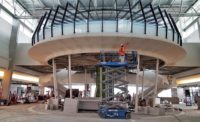A year after Hurricane Katrina, and now in the depths of another hurricane of season, the pace of Mississippi reconstruction (and the work load for construction companies) lags expectations. Although a few firms are earning headlines for meeting extraordinarily tight schedules and advancing high-profile jobs, many others still are wading through swamps of bureaucracy, expending enormous energy haggling with insurance companies and running operations with staffs struggling through waves of depression and the trauma of personal loss.
Katrina changed everything in the region with one awful swipe, but recovery will only come at the pace that people can manage.
The pace is constrained by the available labor and that is constrained by a lack of housing, says Todd Bruce, associate director of Associated General Contractors, Mississippi. �The big construction boom really hasn�t started on the coast. A lot of that is due to labor shortages, which has to do with the housing shortage.�
In the weeks after the storm, even long-established local firms were hard pressed to find housing to sustain their workforces. Gulf Coast Pre-stress Inc., in Pass Christian, bought 20 house trailers for employees who had lost their homes. A year later, they are still employee-occupied. On the edge of the GCP yard, just past the employee trailer park, a boat remains lodged among some old piling test pieces, forgotten amid the immediate concerns of rebuilding.
|
Big projects setting up also have resorted to extraordinary measures. �We built a work camp to house employees,� says Allen Nelson, project manager for the Granite/Archer Western joint venture building the $266.8-million Bay Saint Louis U.S. 90 Bridge. The project is a big customer for Gulf Coast Pre-Stress. �We bought 30 mobile homes,� he says, �and set up in the same area as the homes, we have all the utilities for RVs.�
Nelson says when he arrived in Mississippi on Feb. 1, he couldn�t believe the devastation. A year after the storm, he still sees the trauma of loss in the eyes of the people around him. And as if the $100,000 and $50,000 per day liquidated damages for the first and second milestones on the Bay St. Louis Bridge weren�t enough incentive, Nelson says the importance of rebuilding the bridge quickly is impressed on him continually through experiences in the community. He tells of a man he met in the grocery store: �He hadn�t seen a piece of his home since the storm,� Nelson says. �When he found out I was working on this bridge, he almost cried. He told me to hurry up and get it done.�
Throughout Mississippi�s Gulf Coast, reconstruction is a study in contrasts. Vacant slabs dot neighborhoods in Pass Christian, Long Beach, Gulfport and Biloxi, graced occasionally by the stark white, signature FEMA trailers. The behemoth Beau Rivage Casino devours the shoreline with flashing neon lights, brilliant landscaping and freshly painted parking lot lines. Blown-out hotels and souvenir shops stand naked beside gleaming new fast food restaurants and gas stations, with windows emblazoned with signs that scream �We�re open!� and �Help Wanted!�
At open businesses, lines of patrons snake out the doors. Glitzy casino shuttle-vans and work trucks plastered with�the logos of national contractors share the roads with beat up, muddied vehicles bearing out-of-state plates and interiors heaped with personal belongings. Everywhere, the incredible, overwhelming loss is juxtaposed with the sheer grit and determination to forge ahead.
 Related Links:
Related Links: 

Post a comment to this article
Report Abusive Comment